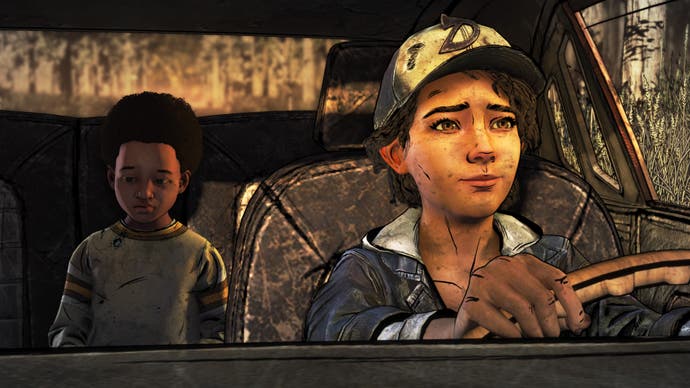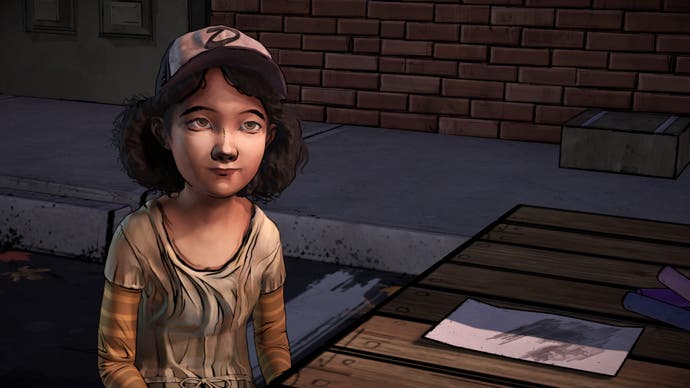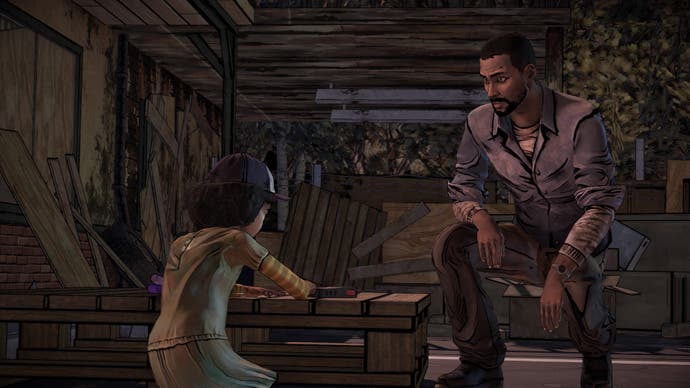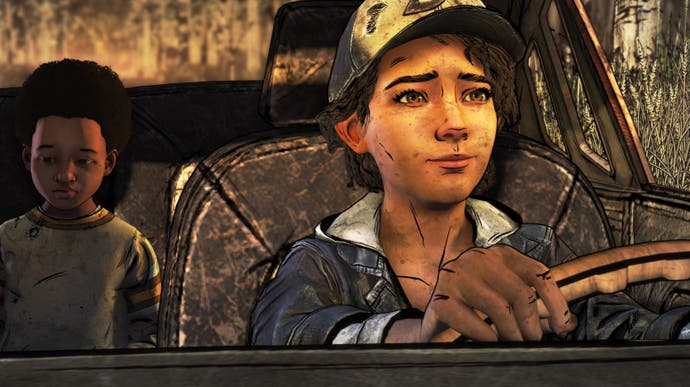How The Walking Dead gave birth to a feminist icon
My darling Clementine.
The final season of Telltale's The Walking Dead is working to its conclusion, and the six year adventure of Clementine is coming to an end. She has been a fan favourite from the start, and over the years we've seen her grow from a nervous first-grader to a mature young woman. Her character development is unprecedented in games and now, with the end to her story fast approaching, Clementine has taken her place among the great female protagonists.
With The Walking Dead following Telltale's style, many of Clementine's choices are determined by the player (then again, being a Telltale series, most routes tend to lead the same way in the end, meaning her growth is pretty much the same for everyone). In the first title, Clem isn't the lead, but rather an eight-year-old 'damsel in distress' who the player can mould through teaching her valuable life lessons. During your time playing as Lee, Clem sticks to you like glue, constantly looking to you to guide her through the new, apocalyptic world.
She's clever for her age and has a sharp sense of right and wrong, but you never forget that she's just a child. When she meets Duck it becomes even clearer. She giggles as she tells you about the bug she put on his pillow, and proudly shows you her leaf rubbing. Clementine remains convinced through the majority of the first season that she'll find her parents and have her happily ever after. That is, until things take a turn for the worse.

With Lee bitten, Clementine quickly matures, finally realising that she won't always have someone to guide her. And she continues to mature through every new addition to the season. She goes from being an important, but less influential part of her next group to being a totally self-sufficient survivor in the third season.
And finally, in The Final Season, Clementine has come full circle. She's now a stand-in mother for AJ, much like Lee was to her. And like Lee, she is deeply protective of the child under her care, standing up to anyone who questions her thinking. Although we're only one episode in, we can see that Clem cares much more about keeping AJ safe than she does her own path in life.
The Clementine we're seeing now is a far cry from the one we were introduced to at the very beginning, yet we're still able to see the impact each choice along the way has shaped who she is now. She's a damsel turned heroine. Women in games tend to be one or the other. You're Princess Peach, or you're Lara Croft. Clementine is both, and in a way, neither. Her actions are sometimes flawed and can go wrong. She's a very human character in a world of inhumanity. It makes her a better role model than many of her peers. We're actually able to relate to her. She's not unobtainable perfection, nor does she have supernatural powers. She could be anyone you walk past on the street.
And this relatability stretches to her physical appearance too. Women are still largely sexualised in games, though thankfully this is slowly beginning to change. Clementine started off as a child, devoid of all sexuality. Although she has now grown into an adult, she still isn't viewed in a sexual way. There's no temptation on the part of the developers to squeeze her into a tank top and shorts, a fate many other female leads have met - she's a survivor, through and through.

Not only is Clem not sexualised, but she isn't white either. Even now you'd be hard pressed to think of many female protagonists that are either black, Asian, or mixed race. It may seem insignificant in the grand scheme of things - the colour of your skin doesn't affect the story in any way - but it's so important when it comes to representation. Gaming is still predominantly white, which makes it hard for people who aren't to connect to the characters on the screen. But, being part black, part Asian, Clem represents a group never previously represented in a big title, and doesn't succumb to black stereotypes - or 'urban', as Kenny so subtly put it.
As she grows up, Clementine becomes more and more outspoken, and much braver in a world that would see the majority of us cowering in the corner. She holds her own in a very male-dominated world. People who don't know her often assume that she's weaker because she's female, but the game never leaves it too long before she proves them wrong. Clementine has become a leader in so many groups, and has no trouble pointing her gun at those who threaten her. She's a strong-willed character and we always know that she is to be taken seriously.
At times we forget she's female, and that's exactly how good female characters should be written. Gender doesn't matter as much in a zombie apocalypse - while Clementine is often underestimated on account of her age, there isn't even the implicit suggestion that being female holds her back. She can even point to her own powerful female role models, like Season One's Molly or Jane from Season Two, as key figures in her personal growth.

She's part of a growing list of strong, younger female leads who define their franchise, rather than supporting a more recognisable male. The Last of Us Part 2 sees Ellie, like Clementine, progressing from an object of the game to its subject. The explosive success of Horizon: Zero Dawn was thanks in part to its self-assured and savvy protagonist, Aloy, who we again watch mature. None of these characters are a finished article; a Samus, or a Tifa. We follow and connect with these girls - women - like never before. And it makes all the difference.
The games industry still isn't that welcoming of its female members. A mass outcry over female characters in Battlefield 5, which at its peak was nothing short of toxic, gave us all a bitter reminder of that fact. Clementine, as a powerful feminist figure, is someone we can cling to as a real beacon of hope for the future. Beyond that, she's a character everyone grows to love. With The Final Season building to its emotional conclusion, there's anxiety over the safety of a character that every player has become attached to. No matter what happens to her now, Clementine will remain a cherished part of gaming history. She has become something more important than even Lee could have imagined.

